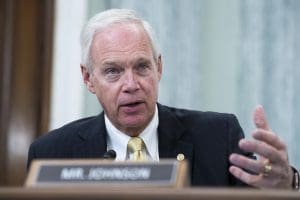Ron Johnson says America should bring back microchip manufacturing — but voted against it
The Republican senator claimed the United States should manufacture ‘certain strategic products,’ but his voting record says otherwise.

Sen. Ron Johnson (R-WI) said on Thursday that the United States should focus only on bringing home certain “strategic” manufacturing jobs, such as making microchips. But back in March, he fiercely opposed a bill designed to help American chip manufacturers compete against Asian manufacturers, panning the idea as governmental meddling.
Johnson, who is facing an uphill battle in his quest to win a third six-year Senate term, appeared on the right-wing David Webb Show, in an interview first flagged by the progressive research group American Bridge 21st Century. There, he argued that only some manufacturing jobs should be brought back to the United States.
“We need to bring back certain — not all — certain strategic products. Things like these microchips, pharmaceutical ingredients,” he urged.
Johnson also hosted a tele-town hall on Thursday and made similar comments when a constituent asked him about the proliferation of cheap goods from China.
“There are certainly strategic products we have to bring back — certain microchips. I really blame the private sector for allowing these strategic products to be manufactured in less-than-perfectly stable geopolitical countries. You know, like all these chip manufacturings [sic] in Taiwan or South Korea, for example. We gotta bring that back,” he urged, cautioning that “bringing back high-labor content products doesn’t make a whole lot of sense.”
“Only purchasing things made in America really doesn’t make a whole lot of sense,” he continued. “Economies are very complicated, but I don’t think we should bring everything back, but we absolutely need to bring back a number of very strategic products, otherwise we make ourselves very vulnerable.”
While Johnson now claims “we absolutely need to bring back a number of very strategic products,” he vocally opposed legislation to make that possible.
At a March 23 hearing on the bipartisan Creating Helpful Incentives to Produce Semiconductors (CHIPS) for America Act at the Senate Committee on Commerce, Science, and Transportation, Johnson grilled Intel CEO Patrick Gelsinger.
After Gelsinger said the $52 billion bill to incentivize domestic semiconductor manufacturing was urgently needed and “justified,” Johnson answered that doing so would amount to the United States government unfairly advantaging U.S. businesses:
I think my concern is when government starts attempting to allocate capital, it just screws things up. It doesn’t do it very efficiently or effectively. I’m concerned, as opposed to pushing the unfair trade practice route, going that route, to just, well, let’s join in, let’s engage in the same type of activity.
It ends up with a misallocation of capital. Are you concerned about that? Because you have government picking the winners and losers in this case.
Johnson was one of just 32 senators to vote against the Endless Frontier Act, which included the microchip legislation and other programs to boost American industry, on June 8.
Further, Johnson has previously embraced international outsourcing of jobs previously, reportedly saying at a Sept. 22, 2020, online chat with real estate agents: “To me, it makes no sense for American workers to produce high-labor-content products. Let the billions of people around the world do that and provide us these goods — high quality, dirt cheap. That to me is economically efficient.”
Johnson has not only opposed efforts to bring manufacturing jobs back to the United States from abroad but has also refused to do anything to try to bring them to his own constituents.
For months, he has been under fire from Wisconsin labor unions and voters for refusing their pleas that he ask Oshkosh Defense — a top Johnson campaign donor based in Wisconsin — to locate over 1,000 new postal vehicle manufacturing jobs in his own state instead of South Carolina.
“It’s not like we don’t have enough jobs here in Wisconsin,” he told reporters on Feb. 6. “I think when using federal tax dollars, you want to spend those in the most efficient way and if it’s more efficient, more effective to spend those in other states, I don’t have a real problem with that.”
Representatives for both Johnson’s Senate office and reelection campaign did not respond immediately to inquiries for this story.
At the same time, Johnson has declined to use his position to fight to bring high-wage jobs to his country or state, he has also complained that Americans are too reliant on government aid.
“Democrats are dedicated to, again, making more Americans dependent on government, growing government, increasing their control over our lives,” he told Fox Business Network on June 2. “That’s why I say they must be stopped.”
Published with permission of The American Independent Foundation.
Recommended

Biden calls for expanded child tax credit, taxes on wealthy in $7.2 trillion budget plan
President Joe Biden released his budget request for the upcoming fiscal year Monday, calling on Congress to stick to the spending agreement brokered last year and to revamp tax laws so that the “wealthy pay their fair share.”
By Jennifer Shutt, States Newsroom - March 11, 2024
December jobs report: Wages up, hiring steady as job market ends year strong
Friday’s jobs data showed a strong, resilient U.S. labor market with wages outpacing inflation — welcome news for Americans hoping to have more purchasing power in 2024.
By Casey Quinlan - January 05, 2024
Biden’s infrastructure law is boosting Nevada’s economy. Sam Brown opposed it.
The Nevada Republican U.S. Senate hopeful also spoke out against a rail project projected to create thousands of union jobs
By Jesse Valentine - November 15, 2023








































































